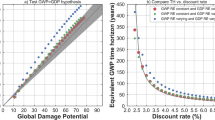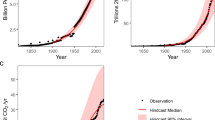Abstract
We develop a method for finding optimal greenhouse gas reduction rates under ongoing uncertainty and re-evaluation of climate parameters over future decades. Uncertainty about climate change includes both overall climate sensitivity and the risk of extreme tipping point events. We incorporate both types of uncertainty into a stochastic model of climate and the economy that has the objective of reducing global greenhouse gas emissions at lowest overall cost over time. Solving this problem is computationally challenging; we introduce a two-step-ahead approximate dynamic programming algorithm to solve the finite time horizon stochastic problem. The uncertainty in climate sensitivity may narrow in the future as the behavior of the climate continues to be observed and as climate science progresses. To incorporate this future knowledge, we use a Bayesian framework to update the two correlated uncertainties over time. The method is illustrated with the DICE integrated assessment model, adding in current estimates of climate sensitivity uncertainty and tipping point risk with an endogenous updating of climate sensitivity based on the occurrence of tipping point events; the method could also be applied to other integrated assessment models with different characterizations of uncertainties and risks.








Similar content being viewed by others
References
Ackerman F, Stanton EA, Bueno R (2010) Fat tails, exponents, extreme uncertainty: Simulating catastrophe in dice. Ecol Econ 69(8):1657–1665
Cai Y, Judd K, Lontzek T (2012) Dsice: A dynamic stochastic integrated model of climate and economy. SSRN Scholarly Paper ID 1992674, Social Science Research Network
Cai Y, Judd K, Lontzek T (2013) The social cost of stochastic and irreversible climate change. Working Paper 18704, National Bureau of Economic Research
Costello CJ, Neubert MG, Polasky SA, Solow AR (2010) Bounded uncertainty and climate change economics. Proc Natl Acad Sci U S A 107(18):8108–10
Dowlatabadi H (1995) Integrated assessment models of climate-change - an incomplete overview. Energy Policy 23(4-5):289–296
Geist M, Pietquin O (2011) Parametric value function approximation: A unified view. In: 2011 IEEE Symposium on Adaptive Dynamic Programming And Reinforcement Learning (ADPRL), pp 9–16
Gerst MD, Howarth RB, Borsuk ME (2010) Accounting for the risk of extreme outcomes in an integrated assessment of climate change. Energy Policy 38(8):4540–4548
IPCC (2013) Climate change 2013: The physical science basis. Technical Report
Jones RN (2000) Managing uncertainty in climate change projections issues for impact assessment. Clim Chang 45(3/4):403–419
Kelly DL, Kolstad CD (1999) Bayesian learning, growth, and pollution. J Econ Dyn Control 23(4):491–518
Kriegler E, Hall JW, Held H, Dawson R, Schellnhuber HJ (2009) Imprecise probability assessment of tipping points in the climate system. Proc Natl Acad Sci U S A 106(13):5041–6
Lenton TM, Ciscar JC (2013) Integrating tipping points into climate impact assessments. Clim Chang 117(3):585–597
Mastrandrea MD, Schneider SH (2004) Probabilistic integrated assessment of “dangerous” climate change. Science 304(5670):571–5
Murphy JM, Sexton DM, Barnett DN, Jones GS, Webb MJ, Collins M, Stainforth DA (2004) Quantification of modelling uncertainties in a large ensemble of climate change simulations. Nature 430(7001):768–72
Murphy KP (2000) A survey of pomdp solution techniques. Technical report, UC Berkeley
New M, Hulme M (2000) Representing uncertainty in climate change scenarios: a monte-carlo approach. Integr Assess 1(3):203–213
Newbold SC, Daigneault A (2009) Climate response uncertainty and the benefits of greenhouse gas emissions reductions. Environ Resour Econ 44(3):351–377
Nordhaus WD (1992) An optimal transition path for controlling greenhouse gases. Science 258(5086):1315–9
Nordhaus WD (2008) A Question of Balance: Weighing the Options on Global Warming Policies. illustrated edition edn. Yale University Press
Pindyck RS (2011) Fat tails, thin tails, and climate change policy. Rev Environ Econ Policy 5(2):258–274
Powell WB (2011) Approximate Dynamic Programming: Solving the Curses of Dimensionality, Wiley
Roe GH, Baker MB (2007) Why is climate sensitivity so unpredictable Science 318(5850):629–32
Rogelj J, Meinshausen M, Knutti R (2012) Global warming under old an new scenarios using ipcc climate sensitivity range estimates. Nat Clim Chang 2(4):248–253
Rumelhart DE, Hinton GE, Williams RJ (1986) Learning representations by back-propagating errors. Nature 323(6088):533–536
Russill C, Nyssa Z (2009) The tipping point trend in climate change communication. Glob Environ Chang-Hum Policy Dimens 19(3):336–344
Webster M, Santen N, Parpas P (2012) An approximate dynamic programming framework for modeling global climate policy under decision-dependent uncertainty. Comput Manag Sci 9(3):339–362
Weitzman ML (2009) On modeling and interpreting the economics of catastrophic climate change. Rev Econ Stat 91(1):1–19
Weitzman ML (2011) Fat-tailed uncertainty in the economics of catastrophic climate change. Rev Environ Econ Policy 5(2):275–292
Zickfeld K, Levermann A, Morgan MG, Kuhlbrodt T, Rahmstorf S, Keith DW (2007) Expert judgements on the response of the atlantic meridional overturning circulation to climate change. Clim Chang 82(3-4):235–265
Zickfeld K, Morgan MG, Frame DJ, Keith DW (2010) Expert judgments about transient climate response to alternative future trajectories of radiative forcing. Proc Natl Acad Sci U S A 107(28):12,451–6
Acknowledgments
The authors would like to extend their deepest appreciation to Dr. Hayriye Ayhan, Dr. Alexander Shapiro, and Dr. Roshan Joseph Vengazhiyil from the School of Industrial & Systems Engineering, as well as Dr. Athanasios Nenes from the School of Earth & Atmospheric Sciences at Georgia Institute of Technology for providing advice and intellectual insight into the research question.
Author information
Authors and Affiliations
Corresponding author
Electronic supplementary material
Below is the link to the electronic supplementary material.
Rights and permissions
About this article
Cite this article
Shayegh, S., Thomas, V.M. Adaptive stochastic integrated assessment modeling of optimal greenhouse gas emission reductions. Climatic Change 128, 1–15 (2015). https://doi.org/10.1007/s10584-014-1300-3
Received:
Accepted:
Published:
Issue Date:
DOI: https://doi.org/10.1007/s10584-014-1300-3




